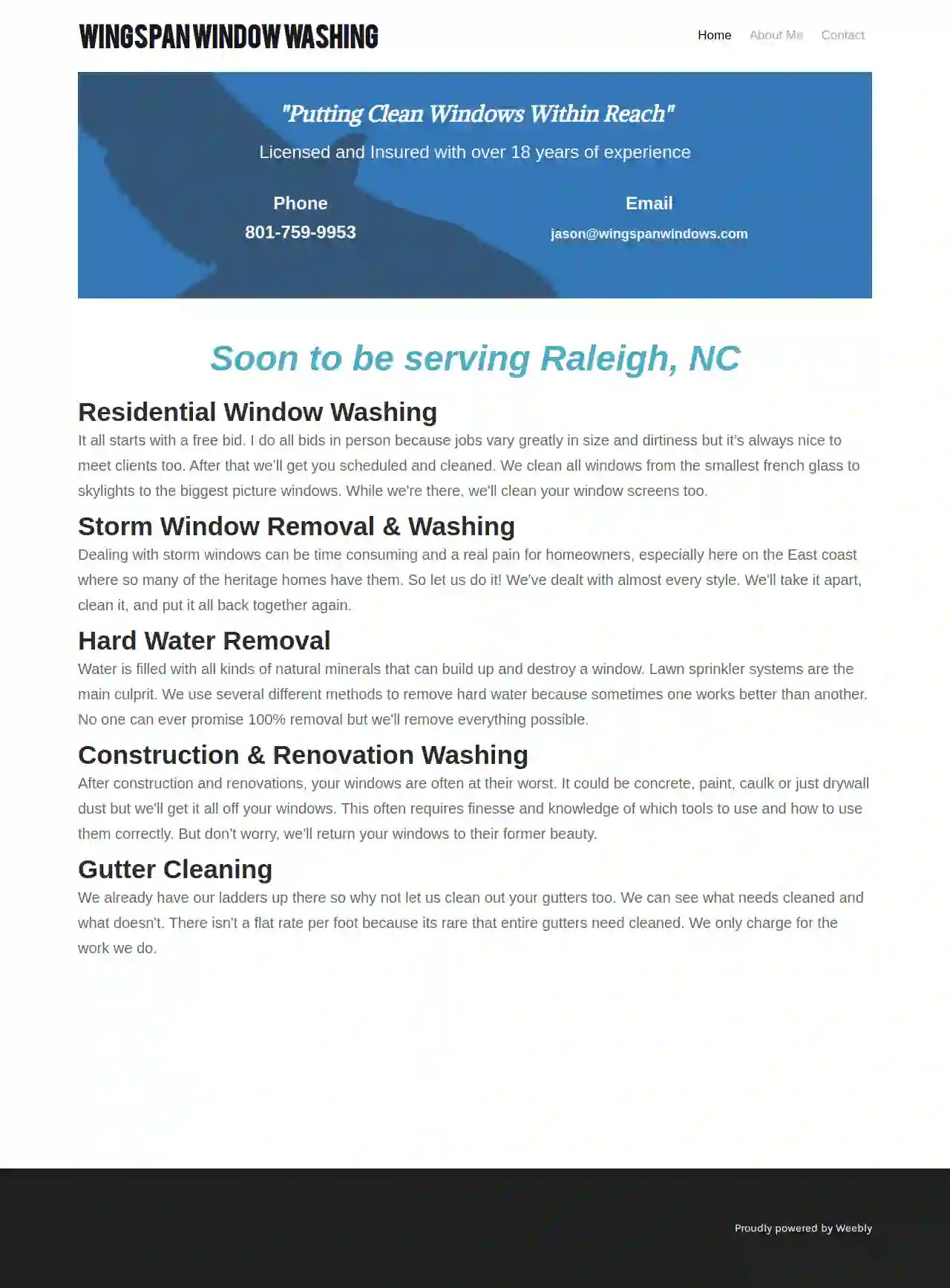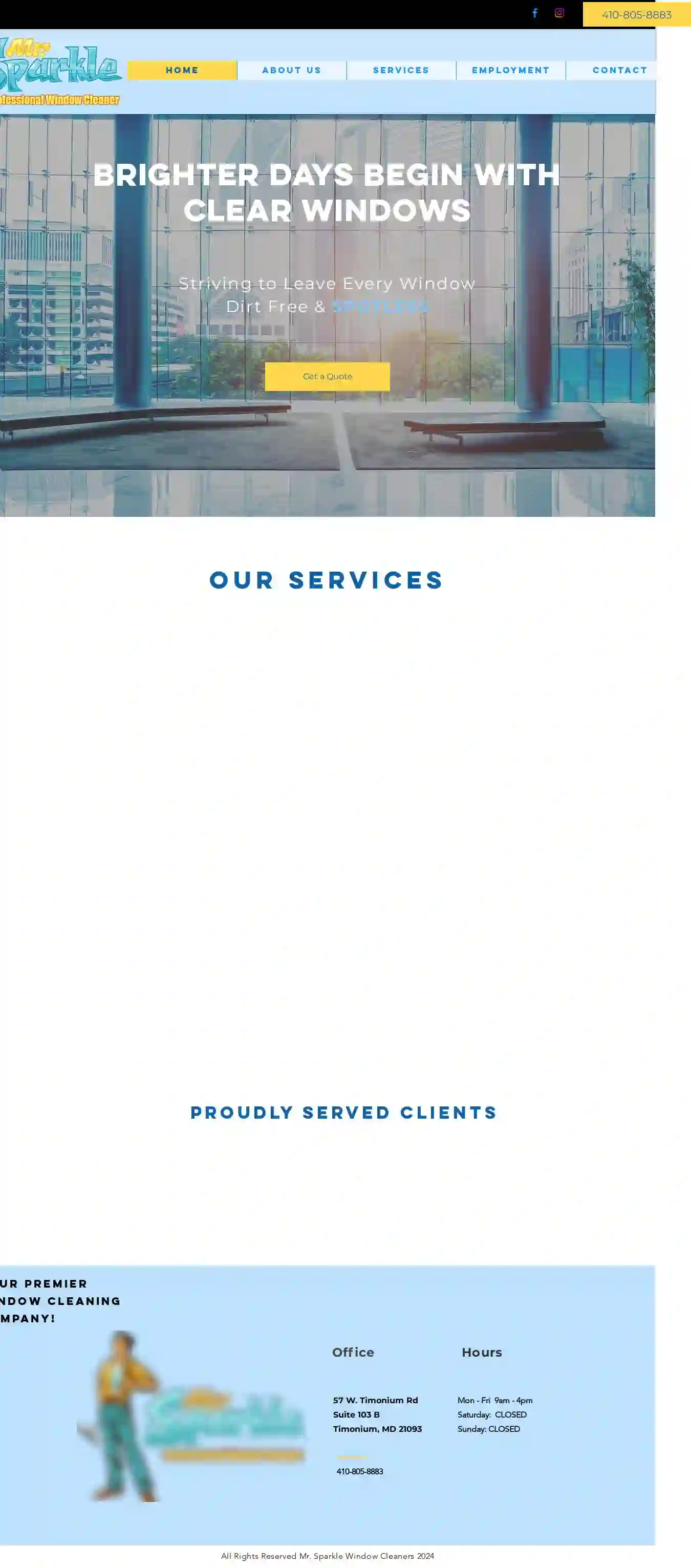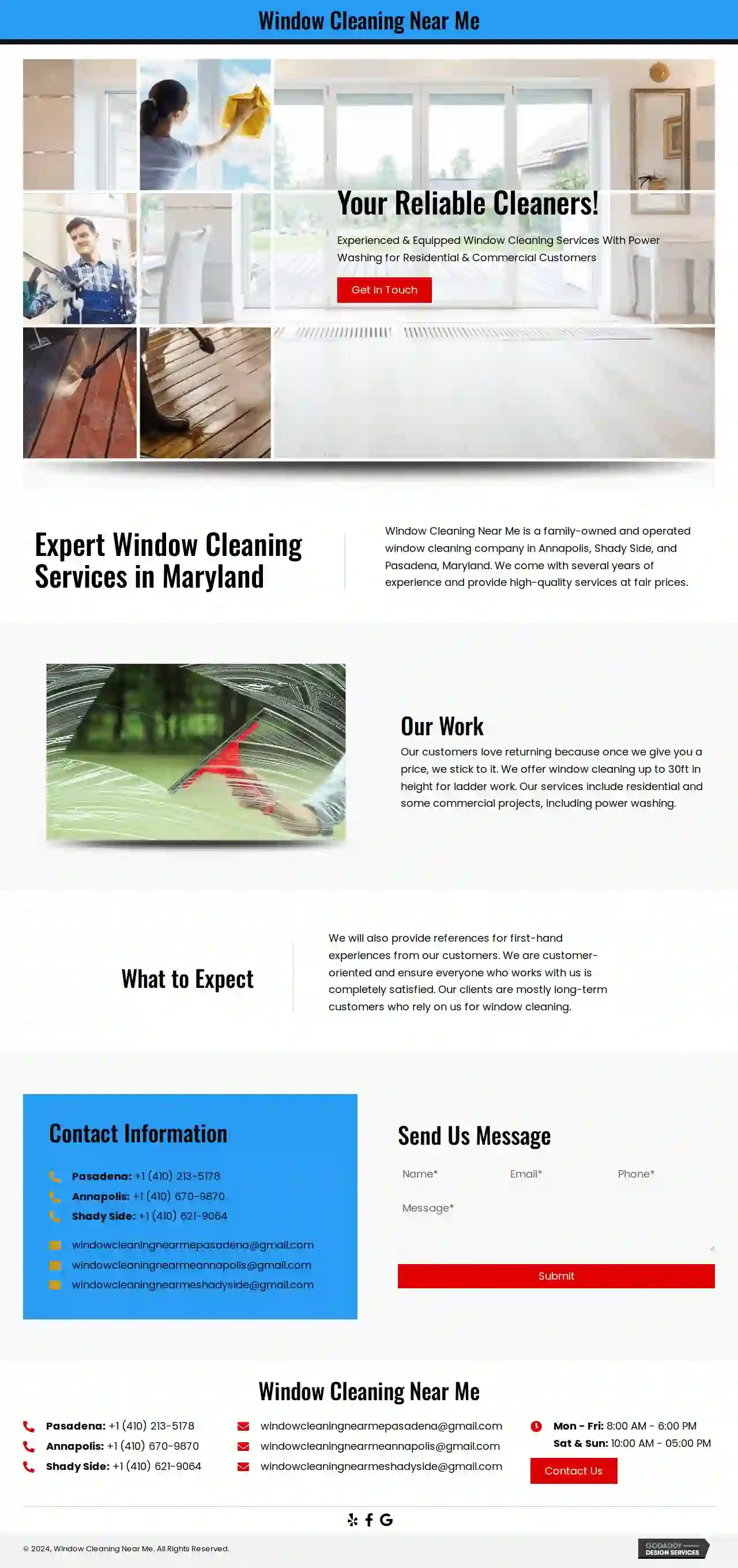Window Cleaning Langley Park
Find the best Window Washing in Langley Park
Receive up to 3 Window Washing quotes for your project today! Compare profiles, reviews, accreditations, portfolio, etc... and choose the best service.

Window Universe Baltimore
3.85 reviews123 Main St, Baltimore, 21204, USWelcome to the future of replacement windows in Baltimore. Window Universe has taken the hassle out of replacing your windows and doors in Baltimore, MD and the surrounding area. Our window experts are not commission based so they will help you find the right solution, not the most expensive. We offer detailed pricing and product info by email so you can evaluate it on your own time with no pressure. All projects are professionally measured. Then products are custom made, installed by the manufacturers installation service and backed by significant warranties to ensure quality results. No payment is due up front and great financing options are also available. We offer a very wide range of options and we have the scale to help with any project from 1 to 1000 windows and doors. Request a quote by email today and you'll see why Window Universe is the future of replacement windows.
- Services
- Why Us?
- Accreditations
- Our Team
- Testimonials
- Gallery
Get Quote
Carpet, Window and Power Washing Cleaning, LLC
1920 Linden Avenue, Baltimore, 21217, USMaryland's Full Cleaning Service. Our CLEANING Services. Carpet/Upholstery Cleaning. Our cleaning services are best in class. We spare no expense to ensure your carpet and upholstery is wonderfully restored to near new quality that is safe and enjoyable for your family. Power Washing. Our power-washing cleaning services include vinyl siding, driveways, sidewalks and much more. We use a gentle but effective cleaning solution to ensure the best results. Window Cleaning. We pride ourselves on using the best tools and cleaning solutions. Our techs pay close attention to detail while servicing your home so your windows have a long-lasting sparkle. At CQC, we are committed to providing our residential and commercial clients a service of the highest standards. We take pride in striving to become your first option when looking for high-quality cleaning services, our focus is on customer satisfaction, professionalism and expertise; and are driven by the purpose of exceeding our clients expectations and earning their valuable recommendations.
- Services
- Why Us?
- Our Team
- Gallery
Get Quote
Wingspan Window Washing
597 reviewsBaltimore, US"Putting Clean Windows Within Reach" Licensed and Insured with over 18 years of experience Jason Markey, the owner and operator of Wingspan Window Washing, brings 18 years of experience to the table. His journey began in Vancouver, BC, where he specialized in high-rise window washing and pressure washing. A move to Salt Lake City led him to establish his own company, and subsequent work in Baltimore, MD, provided valuable insights into the unique challenges of heritage and historical homes. Wingspan Window Washing is dedicated to providing top-quality work for residential clients, specializing in low-rise buildings (up to 3 stories) but occasionally taking on taller projects depending on their construction. The company's philosophy is simple: "A quality job at a fair price." Soon, Wingspan Window Washing will be expanding its services to Raleigh, NC. Residential Window Washing It all starts with a free bid. I do all bids in person because jobs vary greatly in size and dirtiness but it’s always nice to meet clients too. After that we’ll get you scheduled and cleaned. We clean all windows from the smallest french glass to skylights to the biggest picture windows. While we're there, we'll clean your window screens too. Storm Window Removal & Washing Dealing with storm windows can be time consuming and a real pain for homeowners, especially here on the East coast where so many of the heritage homes have them. So let us do it! We've dealt with almost every style. We'll take it apart, clean it, and put it all back together again. Hard Water Removal Water is filled with all kinds of natural minerals that can build up and destroy a window. Lawn sprinkler systems are the main culprit. We use several different methods to remove hard water because sometimes one works better than another. No one can ever promise 100% removal but we'll remove everything possible. Construction & Renovation Washing After construction and renovations, your windows are often at their worst. It could be concrete, paint, caulk or just drywall dust but we'll get it all off your windows. This often requires finesse and knowledge of which tools to use and how to use them correctly. But don't worry, we'll return your windows to their former beauty. Gutter Cleaning We already have our ladders up there so why not let us clean out your gutters too. We can see what needs cleaned and what doesn't. There isn't a flat rate per foot because its rare that entire gutters need cleaned. We only charge for the work we do.
- Services
- Why Us?
- Our Team
- Gallery
Get Quote
Mr. Sparkle Window Cleaners
4.841 reviewsSuite 103 B, 57 W. Timonium Rd, Timonium, 21093, USBrighter Days Begin with Clear Windows. Striving to Leave Every Window Dirt Free & SPOTLESS. We are a premier window cleaning company, dedicated to providing top-notch services to our clients. Our team of experts is committed to delivering exceptional results, ensuring that every window is cleaned to perfection. With years of experience and a passion for what we do, we are confident in our ability to exceed your expectations. Whether you're a residential or commercial property owner, we have the skills and expertise to meet your window cleaning needs. Contact us today to schedule your appointment and experience the Mr. Sparkle difference.
- Services
- Why Us?
- Gallery
Get Quote
Squeaky Clean Window Washing Services LLC
525 reviewsBaltimore, USSqueaky Clean is a locally based and family owned company in the Owings Mills/ Reisterstown area and have now expanded to York, Pennsylvania. We service all surrounding counties in and around the Baltimore metropolitan area, including Anne Arundel, Baltimore Co, Howard, Carroll, and now in York PA, Lancaster and surrounding counties. Clean Windows can make a huge difference in the mood of your home and your business. A free estimate is given before the work is performed, and the work is guaranteed! (Discounts will be given for referrals.) We know you have dirty windows. Relax, many people do. Cleaning your own windows is a big job. It can be tedious and frustrating, not to mention time consuming and dangerous. So that’s why we are here to help! We can handle all your Residential and Commercial needs. Windows come in various sizes, shapes, and compositions. Our cleaning process is a unique washing technique that leaves your windows exceptionally clean. Our technique keeps your windows clean, and keeps them cleaner longer. We strive for perfection and excellence and we will deliver the finest value in window cleaning services. Affordable year round service Monthly, bi-monthly, weekly, or emergency service Interior/Exterior cleaning Construction clean-up and real estate sales discounted
- Services
- Why Us?
- Our Team
- Gallery
Get Quote
Window Cleaning Near Me
510 reviewsBaltimore, USWindow Cleaning Near Me is a family-owned and operated window cleaning company serving Annapolis, Shady Side, and Pasadena, Maryland. With several years of experience, we provide high-quality window cleaning services at fair prices. Our commitment to customer satisfaction is evident in our long-term clientele who rely on us for their window cleaning needs. We offer window cleaning up to 30ft in height and also provide power washing services for both residential and some commercial projects. We stand by our quotes, ensuring no hidden fees or surprises. For a first-hand experience, we are happy to provide references from satisfied customers.
- Services
- Why Us?
- Gallery
Get Quote
We Clean Baltimore
4.7179 reviewsBaltimore, US- Services
- Why Us?
- Gallery
Get Quote
Skyclean, Inc
8061 Philadelphia Road, Baltimore, 21237, USSince 1989, Skyclean, Inc. has been providing exceptional window cleaning services to hospitals, office buildings, high profile athletic venues, schools and universities, retail centers, and manufacturing facilites. We service the Baltimore Metropolitan Region as well as commercial and hospital properties in Delaware, Southern Pennsylvania, Western Maryland, Maryland's Eastern Shore, and the District of Columbia. We believe that our team is the best in the business, and have complete and total confidence in every person providing our services. Our technicians average more than ten years of window cleaning experience. Skyclean, Inc. finishes each project with the highest level of quality. With a focus on personalized service, competitive rates and customer satisfaction, we’re always striving to meet and exceed expectations.
- Services
- Why Us?
- Gallery
Get Quote
WeatherMaster Windows
4.4146 reviewsBaltimore, USWeatherMaster Windows is a leading provider of high-quality windows and doors. With years of experience, we offer a wide range of products and services to meet your needs. Our team of experts is dedicated to providing exceptional customer service and ensuring that your windows and doors are installed correctly. We serve Maryland and Virginia areas, including Anne Arundel County, Baltimore City, Baltimore County, and more. Contact us today to schedule a consultation and get a quote.
- Services
- Why Us?
- Accreditations
- Gallery
Get Quote
Window World of Baltimore
4.459 reviews1662 Sulphur Spring Rd, Baltimore, 21227, USBaltimore's Replacement Windows, Doors, Siding, and Gutter Professionals Window World of Baltimore installs high quality energy-efficient windows, doors, siding, and more for homeowners around Baltimore, MD. Get A Free Quote A beautiful home starts here. Windows VIEW PRODUCTS Patio Doors VIEW PRODUCTS Siding VIEW PRODUCTS Entry Doors VIEW PRODUCTS Featured Video Preparing Your Home for Installation! Who We Are We're increasing curb appeal, improving efficiency, and enhancing quality of life one home at a time. Proudly Made in America We proudly source materials from the USA and we’re committed to following this tradition. Total exterior solutions We have solutions for your entire home exterior. Windows are just the beginning. Nationally known, locally owned We provide the customer service of a small business backed by a nationally recognized brand. We give you quality and service that goes far beyond anyone else. We opened our doors in 2002 with a promise: "Superior Products, Professionally Installed, at a Guaranteed Low Price."
- Services
- Why Us?
- Accreditations
- Testimonials
- Gallery
Get Quote
Over 60,241+ Janitorial Companies on our platform
Our cleaning services operate in Langley Park & surroundings!
CleaningMatch has curated and vetted the Best Cleaning Businesses in Langley Park. Find a trustworthy business today.
Frequently Asked Questions About Window Cleaning
- Training and Certification: Professional high-rise window cleaners undergo specialized training and certification programs to learn safe working practices and rescue procedures.
- Safety Equipment: They use harnesses, ropes, and other safety equipment to secure themselves to the building while cleaning.
- Risk Assessments: Before starting a job, companies conduct thorough risk assessments to identify potential hazards and implement appropriate safety measures.
- Weather Monitoring: High-rise window cleaning is typically avoided during strong winds or adverse weather conditions to minimize risks.
- Number of Windows: The more windows you have, the higher the cost will generally be.
- Size and Type of Windows: Large windows, multi-paned windows, or windows with special features (e.g., skylights) may cost more to clean.
- Accessibility: Windows that are difficult to reach (e.g., high-rise windows) will require specialized equipment and may cost more.
- Interior vs. Exterior: Cleaning both interior and exterior windows will cost more than cleaning just one side.
- Frequency: Regular cleaning schedules often come with discounted rates compared to one-time cleanings.
- Clean on a Cloudy Day: Direct sunlight can cause the cleaning solution to dry too quickly, leaving streaks. Cleaning windows on a cloudy day or in the shade is best.
- Use the Right Tools: Microfiber cloths are ideal for cleaning glass as they are lint-free. Squeegees are also effective for removing cleaning solution without streaks.
- Clean from Top to Bottom: Start cleaning from the top of the window and work your way down to prevent drips from causing streaks on already cleaned areas.
- Overlap Squeegee Strokes: When using a squeegee, overlap each stroke slightly to ensure complete coverage and prevent streaks.
- Wipe the Squeegee Blade: Wipe the squeegee blade clean after each stroke to remove dirt and moisture that can cause streaks.
- Inspect Thoroughly: Check all windows carefully to identify any issues, such as streaks, missed spots, or damage.
- Document the Problems: Take photos or videos of any unsatisfactory areas to provide evidence.
- Contact the Company: Contact the window cleaning company immediately and politely explain the issues. Provide the documentation you gathered.
- Request a Redo: Ask the company to redo the cleaning in the unsatisfactory areas. Most reputable companies offer a satisfaction guarantee and will be willing to address your concerns.
- Leave a Review: If the company is unwilling to resolve the issues, consider leaving an honest review online to inform other potential customers.
Is it safe for window cleaners to clean high-rise windows?
Reputable window cleaning companies adhere to strict safety regulations and invest in training and equipment to ensure the well-being of their employees and the public.
How much does professional window cleaning cost?
To get accurate pricing, request quotes from multiple window cleaning companies. Be sure to provide detailed information about your windows and cleaning requirements.
What are some tips for cleaning windows without streaks?
With practice and the right technique, you can achieve streak-free windows and enjoy crystal clear views.
What should I do if my window cleaner doesn't do a good job?
Clear communication, documentation, and a willingness to work towards a resolution can help address unsatisfactory window cleaning results.
Is it safe for window cleaners to clean high-rise windows?
- Training and Certification: Professional high-rise window cleaners undergo specialized training and certification programs to learn safe working practices and rescue procedures.
- Safety Equipment: They use harnesses, ropes, and other safety equipment to secure themselves to the building while cleaning.
- Risk Assessments: Before starting a job, companies conduct thorough risk assessments to identify potential hazards and implement appropriate safety measures.
- Weather Monitoring: High-rise window cleaning is typically avoided during strong winds or adverse weather conditions to minimize risks.
Reputable window cleaning companies adhere to strict safety regulations and invest in training and equipment to ensure the well-being of their employees and the public.
How much does professional window cleaning cost?
- Number of Windows: The more windows you have, the higher the cost will generally be.
- Size and Type of Windows: Large windows, multi-paned windows, or windows with special features (e.g., skylights) may cost more to clean.
- Accessibility: Windows that are difficult to reach (e.g., high-rise windows) will require specialized equipment and may cost more.
- Interior vs. Exterior: Cleaning both interior and exterior windows will cost more than cleaning just one side.
- Frequency: Regular cleaning schedules often come with discounted rates compared to one-time cleanings.
To get accurate pricing, request quotes from multiple window cleaning companies. Be sure to provide detailed information about your windows and cleaning requirements.
What are some tips for cleaning windows without streaks?
- Clean on a Cloudy Day: Direct sunlight can cause the cleaning solution to dry too quickly, leaving streaks. Cleaning windows on a cloudy day or in the shade is best.
- Use the Right Tools: Microfiber cloths are ideal for cleaning glass as they are lint-free. Squeegees are also effective for removing cleaning solution without streaks.
- Clean from Top to Bottom: Start cleaning from the top of the window and work your way down to prevent drips from causing streaks on already cleaned areas.
- Overlap Squeegee Strokes: When using a squeegee, overlap each stroke slightly to ensure complete coverage and prevent streaks.
- Wipe the Squeegee Blade: Wipe the squeegee blade clean after each stroke to remove dirt and moisture that can cause streaks.
With practice and the right technique, you can achieve streak-free windows and enjoy crystal clear views.
What should I do if my window cleaner doesn't do a good job?
- Inspect Thoroughly: Check all windows carefully to identify any issues, such as streaks, missed spots, or damage.
- Document the Problems: Take photos or videos of any unsatisfactory areas to provide evidence.
- Contact the Company: Contact the window cleaning company immediately and politely explain the issues. Provide the documentation you gathered.
- Request a Redo: Ask the company to redo the cleaning in the unsatisfactory areas. Most reputable companies offer a satisfaction guarantee and will be willing to address your concerns.
- Leave a Review: If the company is unwilling to resolve the issues, consider leaving an honest review online to inform other potential customers.
Clear communication, documentation, and a willingness to work towards a resolution can help address unsatisfactory window cleaning results.